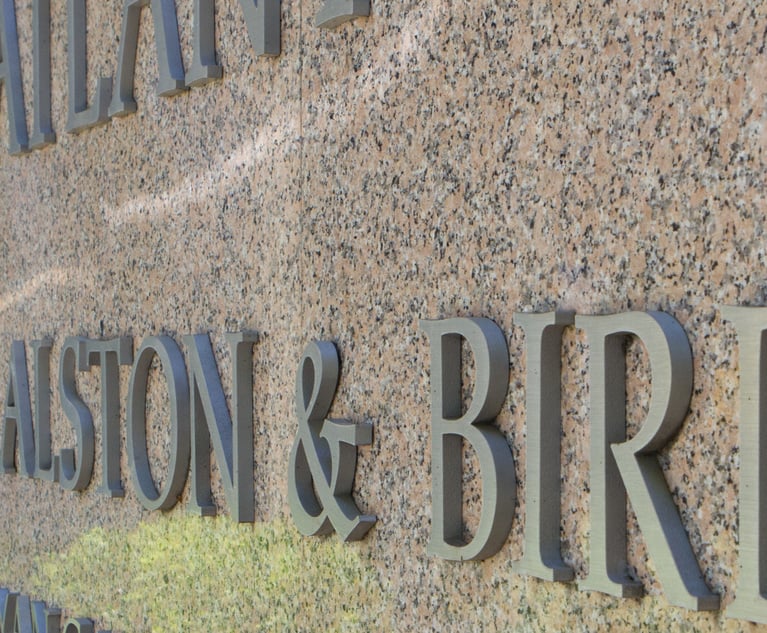 Justice Nels Peterson, Supreme Court of Georgia. (Photo: John Disney/ALM)
Justice Nels Peterson, Supreme Court of Georgia. (Photo: John Disney/ALM)Georgia Supreme Court: Prosecutor Caused Mistrial on Purpose
Justice Nels Peterson wrote that the trial court had broad discretion to declare a mistrial after it found that the DA made "offending comments in hopes that they would result in a mistrial. It found that the DA made the comments 'intentionally and strategically after realizing the evidence was not overwhelming.'"
August 05, 2019 at 04:06 PM
3 minute read
A Georgia man whose 2015 prosecution for murder ended in a mistrial can’t be tried again, the state Supreme Court ruled Monday, upholding a lower court that found the district attorney intentionally caused the first trial to be scrapped.
The ruling by Georgia’s highest court spares Monquez Jackson of Albany from facing a second jury in the 2012 robbery and slaying of Anthony Westbrook. Prosecutors said Jackson shot the victim in the back of the head and left his nude body in a dump after Jackson, his wife and her brother forced Westbrook to withdraw money from an ATM.
The trial judge declared a mistrial in Jackson’s case after concluding Dougherty County District Attorney Greg Edwards made a misleading statement to the jury during closing arguments. The state Supreme Court agreed unanimously with the judge’s decision that a new trial would subject Jackson to double jeopardy.
Justice Nels Peterson wrote for the high court that the trial court had broad discretion to declare a mistrial after it “clearly found that the DA made the offending comments in hopes that they would result in a mistrial. It found that the DA made the comments ‘intentionally and strategically after realizing the evidence was not overwhelming.’”
Edwards did not immediately return a phone message seeking comment. In appealing the trial judge’s decision, Edwards denied that his statements to the jury were improper and said he wasn’t trying to cause a mistrial.
At the 2015 trial, Jackson’s wife and her brother both testified against him as part of a plea deal after they were also charged in connection to the slaying. A fourth defendant, charged with helping the others clean up evidence after the slaying, was never called to testify before the trial jury.
After being warned by the judge to limit any statements about the uncalled witness during closing arguments, the Supreme Court’s decision said, Jackson’s defense attorney told the trial jury: “I wonder what she would have had to say.”
Edwards, in his own closing argument, said he didn’t need the uncalled witness to testify because “all she could tell you is, ‘Yeah, we went back to the car to clean it up.’”
The trial judge found the district attorney’s statement was misleading because the uncalled witness, Tomeka Porter, told authorities before the trial that Jackson’s wife had confessed to being the killer. The judge granted a request by Jackson’s defense attorneys for a mistrial. The trial judge also found the evidence against Jackson was weak. Investigators testified there was no physical evidence linking him to Westbrook’s slaying. And Jackson’s wife and brother-in-law gave sometimes conflicting testimony against him.
Copyright 2019 AP. All rights reserved. This material may not be published, broadcast, rewritten, or redistributed.
This content has been archived. It is available through our partners, LexisNexis® and Bloomberg Law.
To view this content, please continue to their sites.
Not a Lexis Subscriber?
Subscribe Now
Not a Bloomberg Law Subscriber?
Subscribe Now
NOT FOR REPRINT
© 2024 ALM Global, LLC, All Rights Reserved. Request academic re-use from www.copyright.com. All other uses, submit a request to [email protected]. For more information visit Asset & Logo Licensing.
You Might Like
View All


Insurer Not Required to Cover $29M Wrongful Death Judgment, Appeals Court Rules

After 2024's Regulatory Tsunami, Financial Services Firms Hope Storm Clouds Break
Trending Stories
- 1'Largest Retail Data Breach in History'? Hot Topic and Affiliated Brands Sued for Alleged Failure to Prevent Data Breach Linked to Snowflake Software
- 2Former President of New York State Bar, and the New York Bar Foundation, Dies As He Entered 70th Year as Attorney
- 3Legal Advocates in Uproar Upon Release of Footage Showing CO's Beat Black Inmate Before His Death
- 4Longtime Baker & Hostetler Partner, Former White House Counsel David Rivkin Dies at 68
- 5Court System Seeks Public Comment on E-Filing for Annual Report
Who Got The Work
Michael G. Bongiorno, Andrew Scott Dulberg and Elizabeth E. Driscoll from Wilmer Cutler Pickering Hale and Dorr have stepped in to represent Symbotic Inc., an A.I.-enabled technology platform that focuses on increasing supply chain efficiency, and other defendants in a pending shareholder derivative lawsuit. The case, filed Oct. 2 in Massachusetts District Court by the Brown Law Firm on behalf of Stephen Austen, accuses certain officers and directors of misleading investors in regard to Symbotic's potential for margin growth by failing to disclose that the company was not equipped to timely deploy its systems or manage expenses through project delays. The case, assigned to U.S. District Judge Nathaniel M. Gorton, is 1:24-cv-12522, Austen v. Cohen et al.
Who Got The Work
Edmund Polubinski and Marie Killmond of Davis Polk & Wardwell have entered appearances for data platform software development company MongoDB and other defendants in a pending shareholder derivative lawsuit. The action, filed Oct. 7 in New York Southern District Court by the Brown Law Firm, accuses the company's directors and/or officers of falsely expressing confidence in the company’s restructuring of its sales incentive plan and downplaying the severity of decreases in its upfront commitments. The case is 1:24-cv-07594, Roy v. Ittycheria et al.
Who Got The Work
Amy O. Bruchs and Kurt F. Ellison of Michael Best & Friedrich have entered appearances for Epic Systems Corp. in a pending employment discrimination lawsuit. The suit was filed Sept. 7 in Wisconsin Western District Court by Levine Eisberner LLC and Siri & Glimstad on behalf of a project manager who claims that he was wrongfully terminated after applying for a religious exemption to the defendant's COVID-19 vaccine mandate. The case, assigned to U.S. Magistrate Judge Anita Marie Boor, is 3:24-cv-00630, Secker, Nathan v. Epic Systems Corporation.
Who Got The Work
David X. Sullivan, Thomas J. Finn and Gregory A. Hall from McCarter & English have entered appearances for Sunrun Installation Services in a pending civil rights lawsuit. The complaint was filed Sept. 4 in Connecticut District Court by attorney Robert M. Berke on behalf of former employee George Edward Steins, who was arrested and charged with employing an unregistered home improvement salesperson. The complaint alleges that had Sunrun informed the Connecticut Department of Consumer Protection that the plaintiff's employment had ended in 2017 and that he no longer held Sunrun's home improvement contractor license, he would not have been hit with charges, which were dismissed in May 2024. The case, assigned to U.S. District Judge Jeffrey A. Meyer, is 3:24-cv-01423, Steins v. Sunrun, Inc. et al.
Who Got The Work
Greenberg Traurig shareholder Joshua L. Raskin has entered an appearance for boohoo.com UK Ltd. in a pending patent infringement lawsuit. The suit, filed Sept. 3 in Texas Eastern District Court by Rozier Hardt McDonough on behalf of Alto Dynamics, asserts five patents related to an online shopping platform. The case, assigned to U.S. District Judge Rodney Gilstrap, is 2:24-cv-00719, Alto Dynamics, LLC v. boohoo.com UK Limited.
Featured Firms
Law Offices of Gary Martin Hays & Associates, P.C.
(470) 294-1674
Law Offices of Mark E. Salomone
(857) 444-6468
Smith & Hassler
(713) 739-1250






